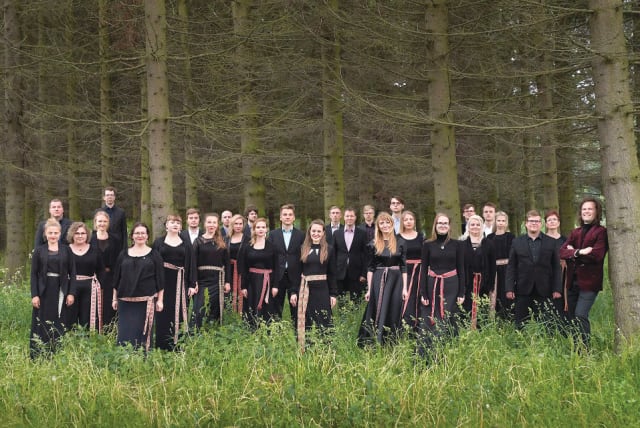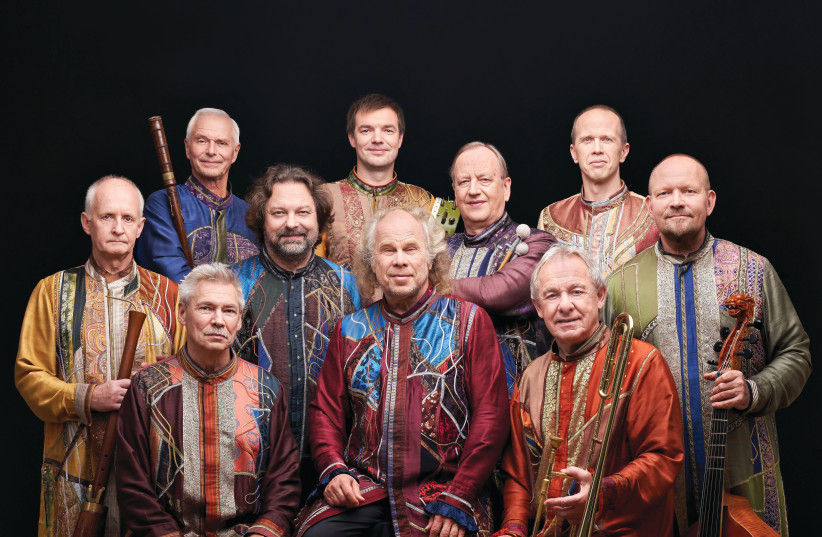Collegium Musical choir highlights Estonian music at Mustonefest

The Estonians appear to have more than their fair share of harmonious vocal gifts
As a youngster growing up in Britain, I remember hearing a male choir from Wales and being mightily impressed. It seemed the Welsh, as a nation, were blessed with sonorous vocal genes denied to other mortals.
Fast forward around half a century and I find myself well and truly mesmerized by a choir of local children and youth emitting celestial sounds in a concert hall in Tallinn, Estonia. I am not a great fan of one-upmanship when it comes to artistic output, despite the plethora of music competitions around the world. Of course, some musicians are more talented and dedicated than others and, it must be said, more adept at handling the pressure and tension that comes with battling for glory. But, when all’s said and done, it is about the spirit, personal expression and the beauty of creation.
That said, the Estonians appear to have more than their fair share of harmonious vocal gifts. Over the past nine years, local music devotees have had numerous opportunities to familiarize themselves with the heavenly sounds that come out of Estonia, at the annual Mustonenfest.
The Mustonenfest
The festival, founded and captained, not to mention starred in, by dynamic conductor and violinist Andres Mustonen, is about to take place for the 10th time, with concerts spread around Israel between February 8 and March 12. The slots feature a wide range of music, performed by instrumentalists and vocalists from Estonia and Israel, taking in works by the likes of baroque composers Handel and Telemann, and contemporary scores by leading Estonian composers, such as 87-year-old Arvo Part and 36-year-old Part Uusberg.
That varied temporal and stylistic viewpoint is fully embraced by 42-year-old conductor, singer and wind instrument player Endrik Üksvärav, who will soon be heading this way to oversee the Evening Pearls program of Estonian song at The Israel Conservatory of Music in Tel Aviv, (February 17, 8:30 p.m.) and the Akko Conservatory (February 21, 8 p.m.).
Üksvärav will also prepare the choral ensemble that will provide the sonic foundation for a rendition of Bach’s “Great Mass” at the Jerusalem Theatre (February 19, 8 p.m.) and The Opera House in Tel Aviv (February 12, 8 p.m.)
The singing troupe in question is Collegium Musicale, from Estonia, which Üksvärav founded in 2010. “I had been thinking about it for a long time,” he says. “I had other choirs to conduct but I was imagining in my head what kind of sound I would like to listen to.” It wasn’t exactly as if Üksvärav had a problem with the vocal music coming out of the country, but he thought the scene could do with some added value. “I was imagining what kind of sound we don’t have in this country.”
He embarked on a cherry-picking exercise. “I started to choose singers who have that kind of sound, and I imagine how they are going to sound together,” he continues. “It took a pretty long time,” he chuckles.
Even with all the choral riches on offer in Estonia, Üksvärav was intent on finding something even more special. “I just invited them and then I said I want to start a new choir. I would say 95% of them agreed, and then we started.” And so Collegium Musicale came to be.
The idea was to get out on the road and mix it with the best around right from the off. “We started in Tallinn, in October 2010, and the next year we participated in the most prominent competitions I found,” Üksvärav recalls.
By all accounts, it was a veritable flyer. “In our first competition we won in five categories, and got the Grand Prix [for best choir in the whole competition],” Üksvärav notes. The official pat on the shoulder was nice, but the financial reward was even better, and far more practical. “We got more than 50,000 euros. We were very happy,” Üksvärav laughs. “Most prizes were 1,000 or 2,000 euros. The level at this competition was really high.”
The windfall naturally helped the choir negotiate the logistics of moving on down its professional road, including appearances around the globe and some recordings.
Notwithstanding the high standard in the domestic arena, the ensemble and its founder did well on home ground too, taking the Choir of the Year title in 2011, while Üksvärav was named Young Conductor of the Year.ÜKSVÄRAV SAYS one of the primary motives for establishing Collegium Musicale was not only to aspire to the highest level of vocal musical performance, but also to spread the word of his compatriots’ creative output. Some of that will be imparted at the Evening Pearls concert. “Our aim is to sing as much Estonian music as we can. If it is possible I always put Estonian music in our program.”
As is the case with the choir’s upcoming Mustonenfest appearances. “There will be works by some very famous composers like Arvo Part, and [63-year-old] Erkki-Sven Tüür,” Üksvärav explains. Last year the latter provided the choir with a particularly emotive and, sadly, pertinent addition to its portfolio. “We sing one of his pieces which is very special. It was written, I think, on March 9, it is called ‘To the Ukraine.’ It is in the Ukrainian language. He sent it right away to me.” Üksvärav responded with alacrity. “We rehearsed it and a week later we released a video recording on YouTube.”
Since that memorable experience at the concert in Tallinn six years ago, I have wondered whether there is something basic in Estonian DNA that results in such pristine, harmonious, pitch-perfect vocal delivery. Üksvärav suggests it is largely a matter of getting kids on board from a very young age. “I think it is because of education. Every school has many, many choirs. The children start to sing very early, from kindergarten. They have highly educated music teachers in kindergartens. It is something very special.” Üksvärav himself is a product of that national educational ethos.
That nurtured talent also proved to be useful in stoking the flames of Estonian patriotism as the then-Soviet republic struggled to regain independence. During that 2017 visit to Estonia, I was told by Mustonen that the fight to free the country of communist shackles was called the Singing Revolution.
Estonians from all walks of life kept their national heritage alive by singing age-old folk songs, including at the Estonian Song Festival, one of the world’s biggest choral events. Mustonen took me to the venue of the quinquennial event which began in 1869, the last edition of which took place in 2019 and featured a staggering 32,000 vocalists.
“This [choral] movement is pretty intensive,” Üksvärav notes. “Every culture and country has its main cultural event. Ours is the song festival.” And wonderful harmonious crystal clear singing across the generations.
Vocal music is Collegium Musicale’s way of keeping not only its own Estonian cultural lifeline intact, but also helping to preserve other languages and keep cultural baggage alive. The ensemble recorded material with texts in Livonian, a Finnic language which no longer has any native speakers, with only several dozen people in the world with any knowledge of it.
Early-mid-20th century composer, Cyrillus Kreek is another Estonian writer whose work has been kept in the public eye and ear by the efforts of Collegium Musicale. Under Üksvärav’s dedicated steady hand, Collegium Musicale is keeping up the good work. “On February 24, after the tour in Israel, we will release the first recordings in the world of a cappella music by Erkki-Sven Tüür,” says the conductor with more than a hint of pride. “That’s on Estonian Independence Day. For us, that is very big things – independence and the music.”
Seem like one and the same.
For tickets and more information: www.tallinntlv.co.il
Jerusalem Post Store
`; document.getElementById("linkPremium").innerHTML = cont; var divWithLink = document.getElementById("premium-link"); if (divWithLink !== null && divWithLink !== 'undefined') { divWithLink.style.border = "solid 1px #cb0f3e"; divWithLink.style.textAlign = "center"; divWithLink.style.marginBottom = "15px"; divWithLink.style.marginTop = "15px"; divWithLink.style.width = "100%"; divWithLink.style.backgroundColor = "#122952"; divWithLink.style.color = "#ffffff"; divWithLink.style.lineHeight = "1.5"; } } (function (v, i) { });

